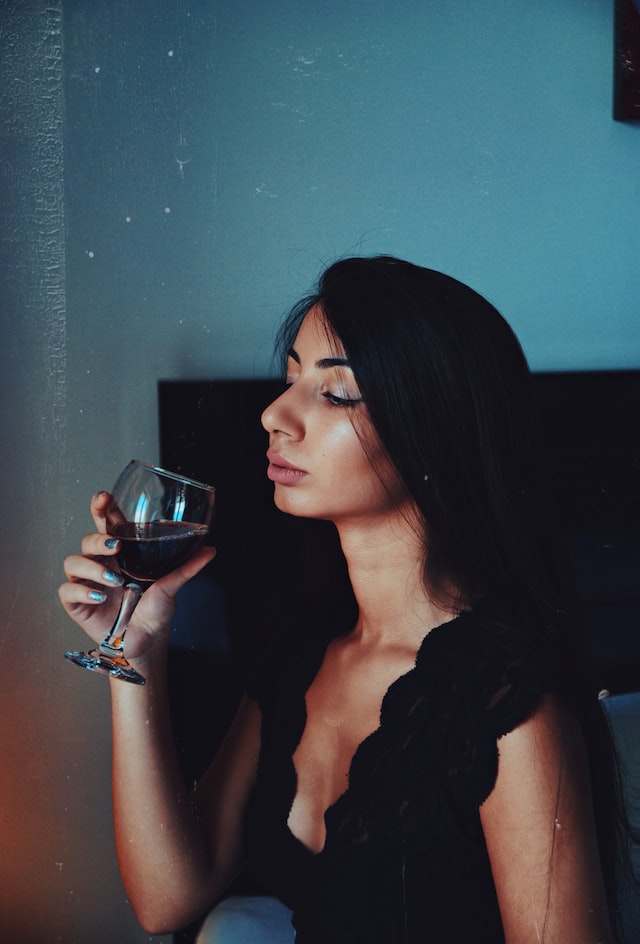
The headache is not just in my head.
It is all over my face. I am so thirsty I feel like I chewed on sand. I get up to get water, and my balance is way off. I am so nauseous, I vomit. Then I vomit again and again. All this vomiting is not helping my headache, or shall I say migraine.
After I peel myself off the toilet, I hover over the sink to brush my teeth and get a glimpse in the mirror. My face is bright red. I look closer, and I have broken blood vessels all over my cheeks and neck from all the throwing up. I lie back down.
Although I know I need it, I cannot fathom taking Tylenol for the headache because the thought of anything in my mouth makes me want to vomit again.
I have the chills, and I am shaking. I take my temperature, and it is 100.6. I wonder, am I sick? My vision is blurry, and I struggle to see clearly. I am moaning. My anxiety is sky-high. I am sick, but not from a virus or bacteria. I have a killer hangover.
This feeling is not foreign to me, but it is way less common than it was in my 20s, and even lesser than in my 30s. Nonetheless, the feeling is familiar. I do not know if it is my tolerance, age, or body rejecting the alcohol because it does not align with my mindful lifestyle. Regardless of the cause—which I think is all three—it is horrid. It is a feeling I loathe and one that makes me self-loathe.
After a few hours of hangover hell, I swear off drinking.
It takes me three days to recover. Yes, three full days. All the while, I am still practicing my daily yoga, meditations, journaling, walking in nature, nourishing properly, and introverting. As I start feeling back to myself, I have the same epiphany that I’ve had intermittently for the past few years, which is that alcohol does not serve me. This awareness (again) confirms what I already know—that drinking is not worth it.
Many of the books, social accounts, spiritual teachers, and doctors I know suggest refraining from alcohol. They all have the same theme, that alcohol has adverse effects on physical, mental, energetic, and spiritual well-being. Even fellow mindful teachers I know refrain from using alcohol. And to be honest, at times, I have felt jealous of their sobriety. As I become more aware, I start noticing more people, even well-known celebrities, going sober. I envy them also.
However, I must be a glutton for punishment because a week after my most recent epiphany, I go out to dinner and have one glass of wine that turns into two. One may argue that two glasses of vino aren’t harmful, but even a couple hit me adversely. While drinking, I do not feel as clear—hence the word buzzed. I become feistier. My looks alter in that my face is less vibrant, and my eyes glaze over. The next day is even worse. I get the booze blues, also known as mild depression. Research does show that alcohol is a depressant, and it certainly has that effect on me.
Even though my doctors advised against it for the physical symptoms I deal with (migraines, sinus issues, and so on), the mental issues (depression, anxiety), and all the crappy stuff I mentioned above, I continued socially drinking. The question is, why? Because of exactly that—it is considered social.
Considering that I like to go out every once in a while and socialize, I fell into the “let’s meet for a cocktail” category. I know—and am very aware—that one does not need to drink to be social. I have been out plenty and have not partaken. But there have been times I have felt this pressure to drink. Perhaps it is self-imposed pressure in fear of judgment from others. Maybe it is judgment from others. Regardless of what it is, it seems that having a cocktail is an expected social norm. A social norm that makes me sick, unfortunately.
Something had to give, so I did a little experiment. I decided to try sobriety for 30 days. Here is what happened.
1. Life was quieter.
The volume, in the proverbial and non-proverbial sense, in my day-to-day life turned down. I went out less, which led to less socialization and fewer conversations. There was less external chatter and less outside noise. As a result, there was more alone time, less speaking, and less listening to others. The quiet was revealing. It made me think of the Ram Dass quote, “The quieter you become, the more you can hear.” As a result of the quietness, I felt somewhat lonelier, but in that space, I stepped into a place of greater awareness, introspection, and deep healing. I could hear my thoughts, witness the thought patterns, and observe my behaviors around them.
2. I noticed a habit.
On two occasions in the 30 days, I remember feeling tired from work and grad school, and I wanted to numb my brain from all the work. I felt like saying, “Screw it. It’s okay to have one glass of wine.” It was at that moment that I realized a habit. I was going for the wine to numb out toward the end of the day. “It is only one glass,” I would say. But one inevitably turned into two because at home it’s easy to go to the fridge and pour more. Yet, as I know, habits take approximately 18-254 days to make or break, so as time went on, the habitual patterns waned.
3. I had aha moments.
Oh, the clarity that comes from having a clear head. As I shared, life was quieter and a bit lonelier sans alcohol, but it was also so much better. My yoga and meditation practices were deeper, which allowed me to think more clearly, feel more intently, and see more. I also processed deeper thinking, feeling, and seeing. If a trigger arose, I recognized it, acknowledged it, thanked it, and got to the root of it. Talk about aha moments! I also visualized more. This paved the way for roads to open up, allowing me to get closer to fulfilling my wishes and dreams.
4. I had more patience.
As it is, I am naturally a patient person. But without the haze of a hangover, I was more patient with all things—including interactions with others and myself, personally and professionally. I noticed more presence, calmness, and capacity for idleness.
5. I slept better.
Research shows that consuming alcohol interrupts sleep for several reasons. When I gave up drinking wine, I slept like a baby. Instead of waking up several times in the night to pee, drink water, and toss and turn—which alcohol does when it metabolizes during sleep—I would sleep eight to nine hours uninterrupted, or with only one interruption. The bottom line is you cannot put a price tag on a good night sleep, and the zzzs I got were priceless.
6. I lost weight.
We may not realize it, but drinking alcohol is calorie-consuming. In addition to the calories in the drinks, even if it is a skinny drink, drinking makes people consume more food, especially salty snacks. Ever wonder why there are pretzels, peanuts, or other salty snacks at bars? It is twofold: the saltiness makes you drink more, and the drinks make you snack more. Anyhow, I have always maintained a thinner, athletic frame because of genetics and my lifelong enjoyment of exercise and movement. However, I had puffiness in my face and around my middle. When I stopped drinking, the puffiness in my face and midsection started to disappear, and my waist thinned out. Therefore, I became less bloated and lost a few pounds.
7. I saved money.
Wine, especially the good stuff, is expensive. Buying a couple of bottles a week in the supermarket adds up. Plus, when you go out, it is even more costly. I can recall many times having gone out with friends when the bar bill was more expensive than the food portion of the bill. As a result of my cleanse, I saved hundreds of dollars a month.
8. I had greater clarity.
This section piggybacks off the aha moments, but I believe it deserves its part. Let me explain. For several years leading up to the 30 days sober experiment, I would do intermittent clarity cleanses (more on that in another blog). These cleanses started when I lived in Santa Monica and have continued on for the past several years. For two weeks, I would stay away from alcohol and consciously choose to spend more time introspecting, practicing daily yoga, meditation, visiting the beach, nourishing properly, getting ample sleep, journaling, and reading a ton. I chose to do these cleanses when called to make life decisions. The space these cleanses provided around the decision(s) paved a clear and concise path for my betterment. In a nutshell, they always led me in the right direction.
9. I fell in love.
It took me getting fed up with my behavior and the repercussions of that behavior for me to make a change. But that is usually the way it goes. I realized that alcohol, no matter the amount, made me physically, mentally, energetically, and spiritually sick. As a woman who prides herself on the concept of health as wealth, it took me getting fed up with my actions to make a change. As a result, giving up alcohol was a radical act of self-love, which made me fall deeper in love with myself and my life.
Overall, my experiment was revealing. I felt so much more. Some of the feelings were pleasant, some not so much. Yet, it was all healing. I can say, without a shadow of a doubt, I feel better—in all ways—when I steer clear of alcohol.
Cheers with a club soda in hand.
~
Please consider Boosting our authors’ articles in their first week to help them win Elephant’s Ecosystem so they can get paid and write more.
~










Read 5 comments and reply